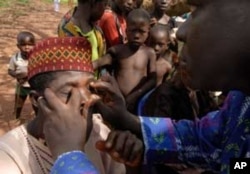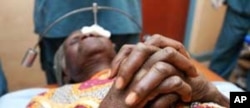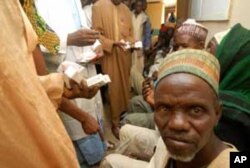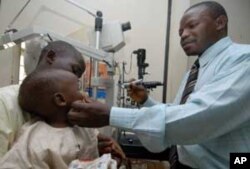A non governmental organization in Nigeria called Sightsavers is working to help restore sight to visually impaired people. The Federal Ministry of Health recently conducted a survey on visual Impairment. It found that about 1,130,000 people in Nigeria are blind. More than a third of them are in the northwestern states.
60-year-old Sani Umar is a farmer who came to Hajia Gambo Sawaba General Hospital in Zaria in Kaduna state -- one of many centers in northern Nigeria providing low cost eye care to the public.
Umar lives in the Ungwar Sanusi section of Kaduna town. He has had cataracts in both eyes for many years, but only recently started coming to the clinic. “After the treatment,” he says, “I started seeing clearly. And I am happy that my sight has been restored.”
Umar is not alone.
The clinic operates on up to 30 cataract patients per week. They’re treated here or in clinics supported by Sightsavers in several states, including Cross River, Kaduna, Kwara, Sokoto and Zamfara.
Sightsavers covers almost all the costs, says Ahmed Danbaba, one of the nurses:
“They provide the drugs, the surgical instruments, even the operating microscopes ... If not for that, I think the cost of cataract surgery would not be affordable."
Sightsavers has been working to prevent, reduce, as well as cure blindness for more than 60 years. It also promotes equal opportunity in the workplace for people with visual disabilities. The NGO works with the ministries of health and its eye centers, especially in the northwest.
The NGO makes eye treatment available at a fraction of the cost of privately owned centers. In these clinics, cataract surgery costs about $170, or N25,000, but the same service is provided at eye centers supported by Sightsavers for $13, about N2,000.
In the past four years outreach centers in the north have treated over 34,000 patients. It plans to operate on over 12,000 patients this year.
Sightsavers has trained 31 ophthalmologists in five Nigerian states.
Cataracts, which can cause blindness, are caused by a build-up of proteins that cloud the lens – the part of the eye that focuses light and produces clear, sharp images.
Cataracts can be caused by many factors, including ageing, smoking, diabetes and dehydration caused by heat and cholera.
Doctors say the local custom of withholding water from women during labor and immediately after giving birth can also contribute to getting cataracts.
The country director for Sightsavers in Nigeria, Sunday Isiyaku, says simple measures like improving hygiene can help prevent cataracts and other diseases, such as trachoma -- a bacterial infection of the eye. Symptoms include discharge from the eye, blurred vision and swollen eyelids. Isiyaku says 80% of blindness is preventable and trachoma can be reduced largely with good hygiene, such as washing one’s face, and keeping one’s environment clean.
Sightsavers is working to expand its campaign for better eye care.
Along with other partners, Sightsavers supports the Nigeria National Blindness and Low Vision Survey, which has provided strong evidence of the need for a national eye health plan.
Sightsavers is credited with raising awareness about eye disease prevention and treatment, while providing care and rehabilitation to those who suffer from it.
Sightsavers as well as other NGOs are pressing the country’s 36 states to produce plans to improve the optical health of all Nigerians.







